Land use planning is transforming our living environments. Our experts dissect the issues raised by current events and share the news and ideas that make us progress together.

Réflexions BC2
Housing of temporary agricultural workers in rural areas amid a housing shortage
Chapters
Introduction
For several years now, agricultural businesses in Quebec have relied on foreign labour to make up for labour shortages. Housing these temporary foreign workers (TFWs) in the current housing shortage raises major planning and urban development challenges that affect many aspects of the agricultural community: housing conditions, balancing the need for seasonal housing with widespread pressure on access to permanent housing, urban and cultural integration of workers and their housing, access to transport and services, and so on.
To fully grasp the scale of the challenge posed by housing TFWs in rural areas, the housing shortage will first be put into context so that its links with changes in agricultural practices can be clearly understood. Next, the main social and urban planning issues arising from this new reality will be addressed, along with the regulatory framework currently in place to deal with them.
This document is not a substitute for an in-depth investigation into the living conditions of temporary agricultural workers, an area where there is considerable room for improvement. Nevertheless, it sets out possible solutions implemented across Quebec to meet the housing needs of TFWs amid a housing shortage to spark discussion and ideas among regional stakeholders.
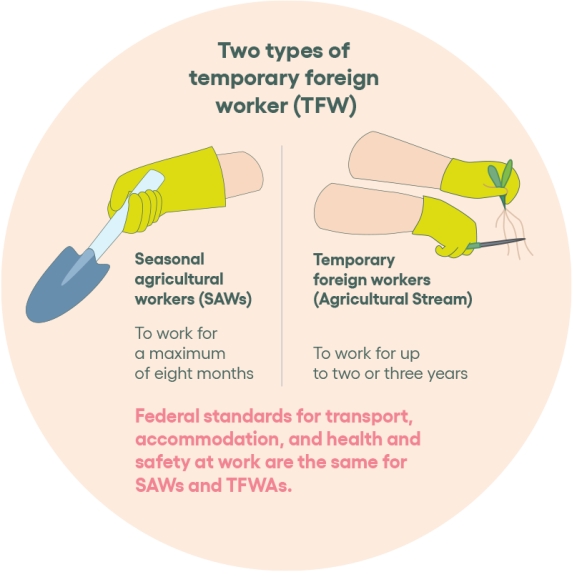
Housing shortage and agricultural activities
Quebec is currently experiencing a housing shortage characterized by a housing supply lower than demand and rising property values and rents. Against this backdrop, a significant proportion of the Quebec population is struggling to find adequate housing. The Canada Mortgage and Housing Corporation (CMHC) estimates that the construction of 860,000 additional housing units will be required in Quebec by 20301 to meet the housing shortage.
In several small towns and municipalities, the availability of rental housing is below the optimal vacancy point (3%). Furthermore, demand is set to increase over the next few years, which will put further pressure on the market.
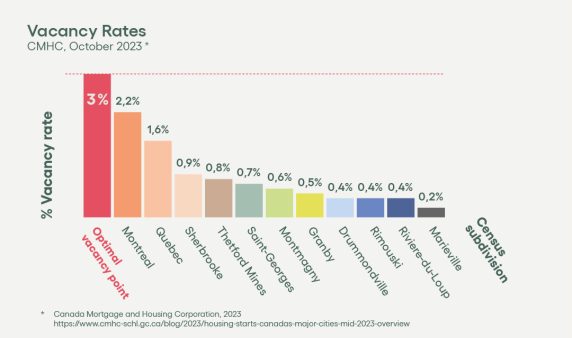
In rural areas, the housing shortage correlates with greater vulnerability linked to the ageing of Quebec’s population, the resulting erosion of average household incomes, and, above all, the gradual retirement of the agricultural workforce.
This situation has led to a growing need for TFWs to maintain the smooth running of agricultural production and food and agro-industrial supply. The housing shortage and the fact that farms are located away from the village core, where key services are concentrated, often make it difficult to provide adequate hospitality and housing to this temporary workforce. Agricultural producers and food processors are particularly hard hit by this shortage. Their production and processing activities require a large workforce that’s not available in their region and that, once there, must be accommodated.
This crisis is not limited to large urban centres. The housing shortage in Quebec is affecting medium-sized and small municipalities and rural areas to a greater extent.2
Changes in farming practices
Part of this situation stems from transitions in agricultural production methods that profoundly transformed Quebec agriculture in the second half of the 20th century. The family farm model was shaken by technological advances, modernization, and the specialization of the agricultural sector,3 leading over the decades to a consolidation of farms, a reduction in their number, and an increase in their size. A rural exodus also took place at the same time. The proportion of the Quebec population living exclusively from farm work is estimated to have fallen from 28.5% in the 1940s to less than 2% in 2010.4
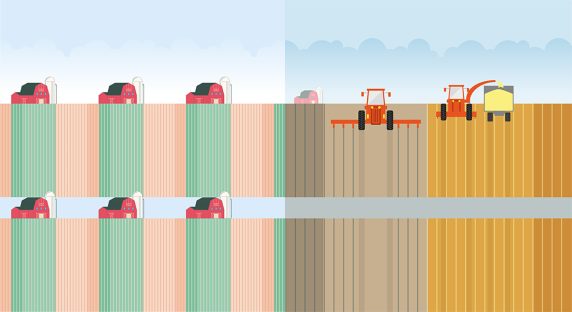
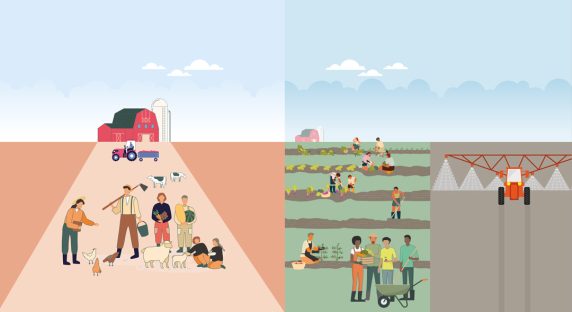
The family farm model is a thing of the past, and agricultural producers now rely on external labour. However, the arduous nature of the work, the low incomes, and the seasonal nature of the jobs discourage local labour. It is against this backdrop that foreign workers are employed, who, despite the difficult working conditions, see an opportunity to increase their income and gain experience outside their country of origin. The exchange rate is generally in favour of temporary workers, who capitalize on the currency differential between Quebec and their country of origin to send money home to improve their family’s quality of life.
To ensure the housing shortage doesn’t hinder the recruitment of their workforce, agricultural producers and agri-food processors are now looking at all the options available to them5: construction of multi-family buildings, renting of houses, conversion of institutional buildings, development of temporary housing, etc. However, these solutions raise complex planning and urban development issues involving a wide range of stakeholders.
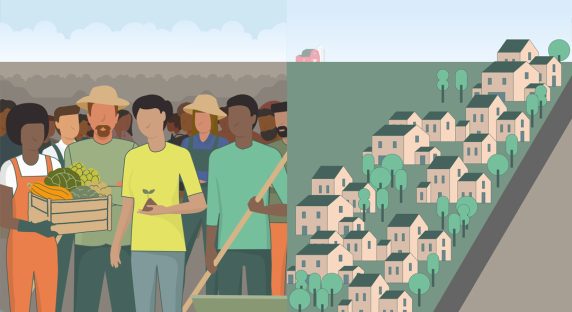
Social and urban planning issues
The economic issues linked to the development of agricultural activities closely intersect with the socio-urban organization of rural areas, particularly when it comes to TFW housing.

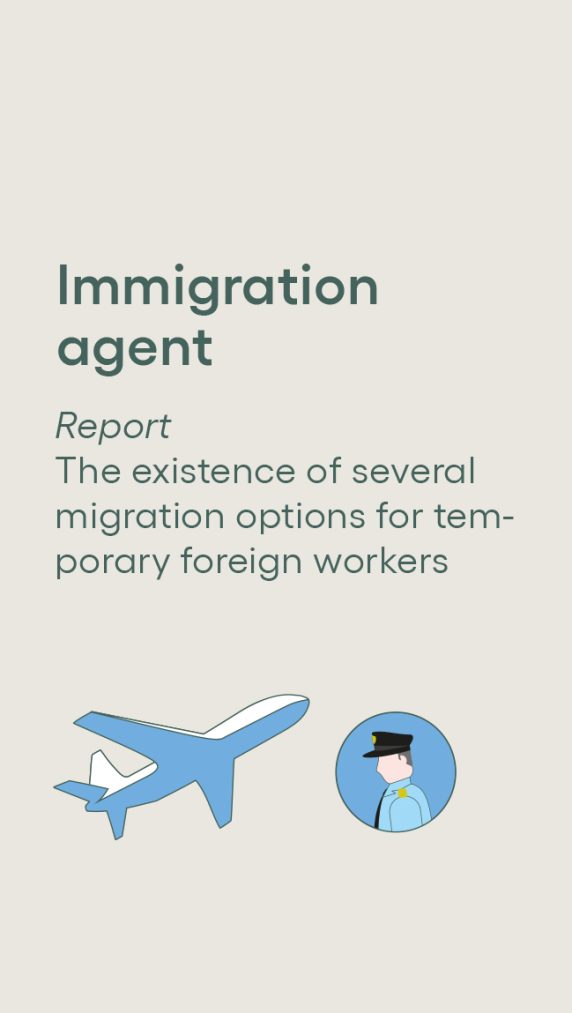
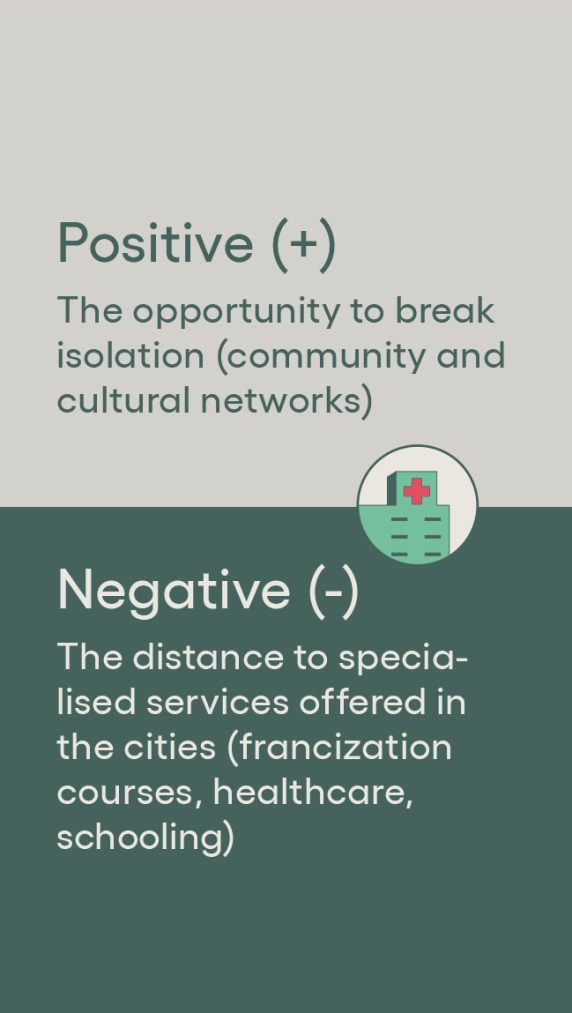
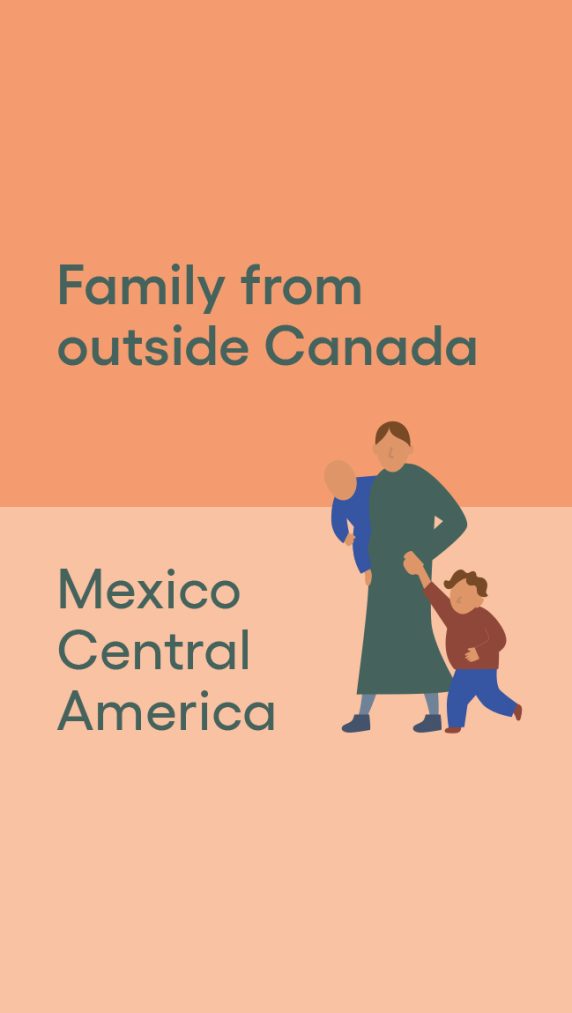
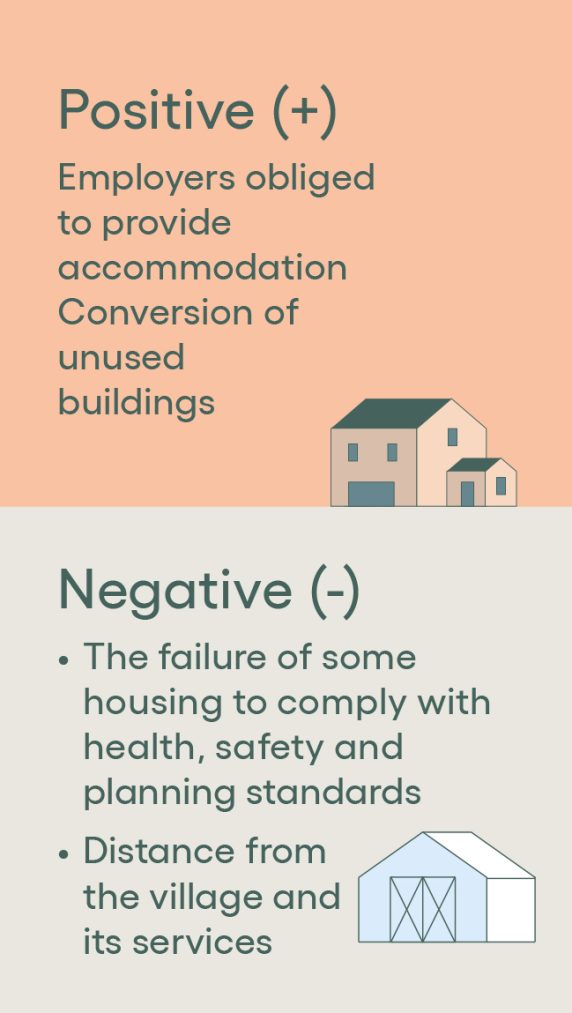


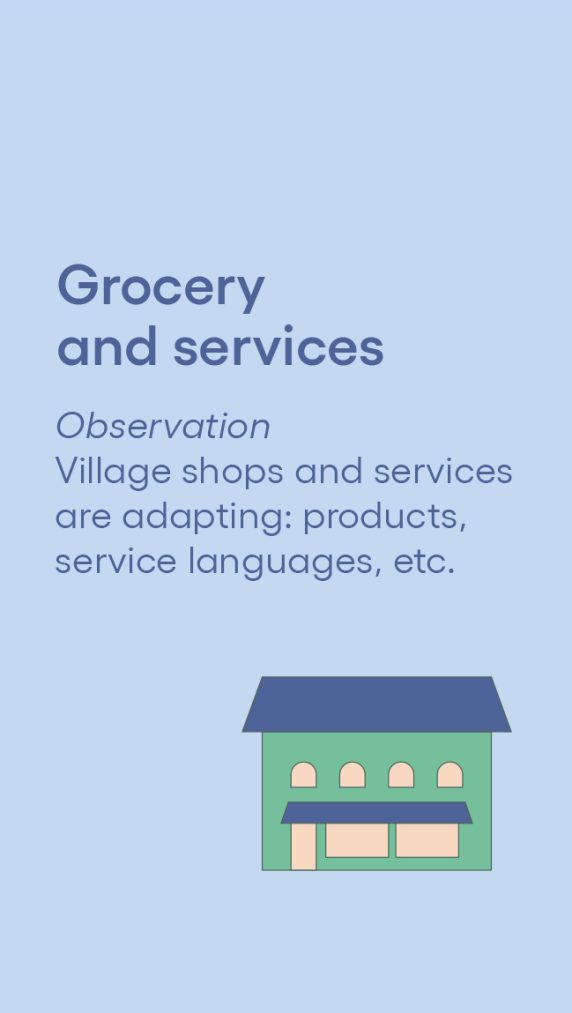
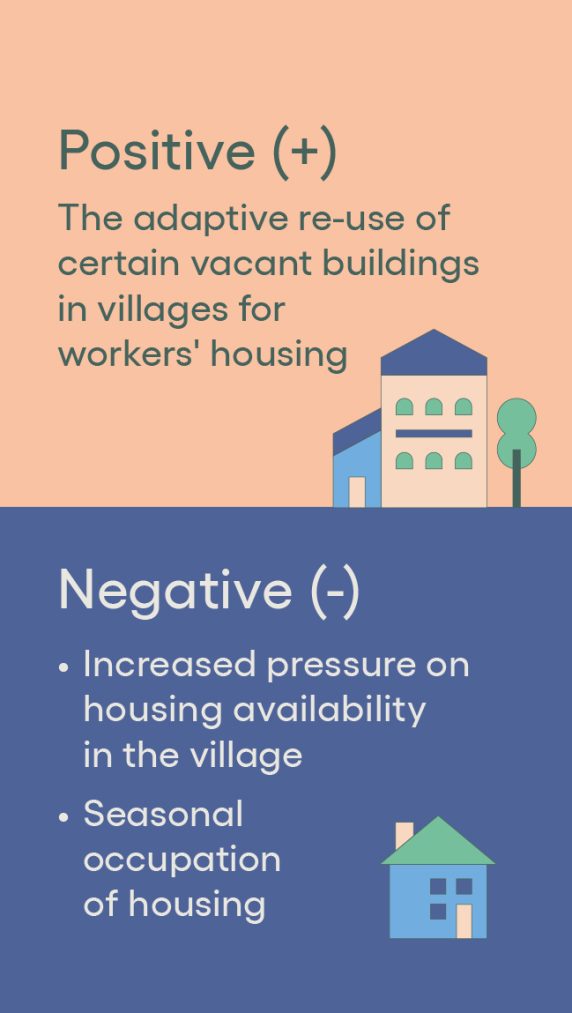
Vulnerability and dependency
Depending on the type of work permit granted to them, TFWs cannot change employers on their own initiative during their stay. For its part, the employer must provide housing on or off the farm, as well as free transport between the place of accommodation and the place of work. If they consider their housing conditions to be poor, TFWs may leave the accommodation provided by their employer and stay in private accommodation. However, seasonal agricultural workers (SAWs) have little access to a car. Therefore, they remain largely dependent on transport provided by their employer. This situation may, in some cases, force SAWs to tolerate inadequate housing.
Furthermore, when workers are accommodated on the farm, they may find themselves far from the services and amenities available in town centres. To overcome this transport dependency, many producers have made bikes available to their workers so that they can travel more independently. As a result, a new type of cyclist has appeared on the roads of rural Quebec. Unfortunately, road infrastructure in rural areas isn’t always conducive to safe cycling.6
Integration
The issue of housing for TFWs also raises the question of their integration and access to the various services offered by Quebec society. These two notions are even more important for TFWAs, who sometimes come accompanied by their families and whose work permit is valid for a period of two to three years. Housing location greatly influences the way in which they can benefit from francization courses, health care, and schooling for their children. Such services are usually offered in urban areas, far from their place of employment, which makes them more difficult to access for TFWAs, whose means of transport are very limited, at least when they first arrive.
According to statistics, 14%7 of TFWAs will eventually become permanent residents. These various services are used by TFWAs and their families to develop social links with the community outside the farm.
Transformation of the environment
On the farm, agricultural producers are setting up various initiatives to house their employees. Farm buildings (barns and sheds) are transformed into residences with bedrooms and living areas. In other cases, producers are using mobile homes or even recreational vehicles to house seasonal workers during the summer months. These new types of accommodation are changing the traditional spatial organization of buildings and functions on farms and creating new built environments that are transforming the rural landscape.
Off-farm housing for TFWs also brings its share of changes to village centres. To meet their needs, producers often acquire a house or apartment building to house their workers. These workers contribute to the vibrancy of the community and can frequent local businesses, some of which adapt to this new clientele by learning a few words of Spanish. However, once winter arrives, this contribution to the social life of the community fades. In fact, some of the buildings used to house TFWs become unoccupied during winter, with empty and underused housing in a context of shortage.
Regulatory framework
As TFW housing is a relatively recent issue, practices are little regulated at the provincial and municipal levels. The current legal framework is mainly aimed at defining the rules that employers must respect to ensure the well-being of their workers, while there are very few specific rules on how to organize accommodation or on how to travel between the accommodation and the farm.
Immigration Canada
To be able to hire temporary foreign workers under the Agricultural Stream, employers are subject to basic requirements that must absolutely be met, particularly regarding transport and housing. These requirements stem from the Temporary Foreign Worker Program set up by the federal government under the Immigration and Refugee Protection Regulations. This policy includes the following requirements:
Transport:
- The employer must provide free return transport between the off-site housing and the place of work, where applicable.
Housing:
- Employers must provide adequate, suitable, and affordable housing, as defined by the CMHC.
- Employers must ensure that the occupancy rate for each unit does not exceed the maximum occupancy rate and that the number of accommodations are sufficient.
- Proof that the off-site or on-farm accommodation has been inspected by the competent provincial, territorial, or municipal authority or by an authorized private inspector must be provided by the employer as a prerequisite.8
The policy sets out criteria for determining whether the proposed housing is suitable for TFWs, some of which could influence the siting or construction standards for a residence intended to house them. For example, criteria have been established for distance from a livestock building, proximity to hazardous materials, ceiling heights, water supply, wastewater treatment system, surface area required according to the number of employees, distance between beds, etc. There is little documentation on the effective application of legislative frameworks. However, failure to comply with them can result in farm businesses being guilty of serious offences and risking permanent prohibition, revocation, or suspension of their activity.
Act respecting the preservation of agricultural land
Currently, the construction of a building in an agricultural zone to house foreign workers (temporary or otherwise) requires the approval of the Commission de protection du territoire agricole du Québec (CPTAQ). If the application is for an agricultural business, a declaration of right is required under section 40 of the Act respecting the preservation of agricultural land and agricultural activities, while in all other cases an application for authorization is required. However, when the property in question is located in an unstructured sector (section 59), it generally cannot be the subject of an application for authorization for residential use. In this context, the CPTAQ recognizes the need to do more in these exceptional cases and is planning an alternative (pilot project) under specific conditions.9
Other provincial and municipal regulations
Of course, many other rules and laws relating to welfare and the environment are applicable when a company is planning housing for its foreign workers. This is particularly true of the regulations arising from the Environment Quality Act. However, very few Quebec municipalities have clear regulations on development and housing for foreign workers, even though they are the host environments for these communities. Regulatory tools are sometimes poorly adapted to the new realities, and it is important to consider the importance of adopting clear guidelines.
Organizations
Given the complexity of the regulatory framework, many businesses are turning to organizations to help them with the process. The Union des producteurs agricoles du Québec, through its Agricultural Employment Centres, can help farm businesses recruit and place employees and offer consulting services for training, human resources management, and occupational health and safety. FERME (Fondation des Entreprises en Recrutement de Main-d’œuvre agricole Étrangère), a not-for-profit organization, is also a key player in the industry, supporting employers in their foreign recruitment efforts. The first TFWs arrived in Quebec’s agricultural sector thanks to this organization that.10
INSPIRING EXAMPLES
Housing for TFWs remains a problematic issue.11 These workers’ precarious living conditions are regularly reported in the media. Stakeholders can take stock of these situations to improve their own practices and choices. Above all, however, it is important to consider what actions can be taken at local, provincial, and federal levels to improve the integration and quality of life of these workers, an area in where there is significant room for improvement.
Against a backdrop of a housing crisis and increasing standards for accommodating workers, farm business owners are sometimes getting creative when it comes to providing suitable accommodation for their TFWs. Many businesses are opting to provide accommodation on their own property, whether by building a new single-family dwelling or a tiny house, installing trailers, or converting a multi-use building (garage and accommodation). Some businesses will acquire or rent homes and residences close to the place of employment. Some inspiring examples combine compliance with housing standards, the development of partnerships, and the redevelopment of vacant buildings in village centres to provide better accommodation for workers.
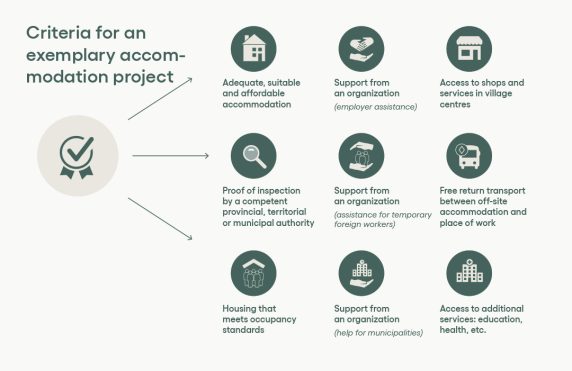

Baie-Saint-Paul head office
Located in the vast Charlevoix region, Baie-Saint-Paul’s Maison Mère is housed in a 16,000 m2 building on 3 ha of land.12 This former convent was converted into a place of creation and innovation in 2017 and offers a variety of services, including coworking spaces and accommodation. With the inauguration of the Charlevoix Club Med and the hiring of several TFWs in the region, Charlevoix municipalities are facing major difficulties in housing workers on their territory. Therefore, the organization in charge of socio-economic development has undertaken to offer accommodation for TFWs and students on the premises of the Maison mère, thereby promoting intercultural exchange in the heart of the town’s urban perimeter.
The old school in Fugèreville
Closed since 2016, the former Fugèreville grade school in Abitibi-Témiscamingue recently underwent a change of use to accommodate foreign workers. The former school, acquired by Olymel in 2022, is set to house around 50 TFWs. This conversion project aims to improve the living conditions of the TFWs, bring the workers together under the same roof, and facilitate the management of the company’s personnel, particularly in terms of transport.13 Moreover, the project is integrated into the heart of the village.
Multi-housing construction
The Chaudière-Appalaches region faces multiple labour challenges. As in many regions, the shortage of housing can be a barrier to the arrival of foreign workers. To alleviate this problem, the Association Aide à l’immigration Canada (AAI Canada) and the municipality of Saint-Damien-de-Buckland have embarked on the construction of a 24-unit building in Saint-Damien-de-Buckland, with rental units designed to accommodate TFWs and their families at reasonable prices, thanks to an agreement with CMHC.14 The project is located in the heart of the village, giving workers access to services and shops.
References
[1] Canada Mortgage and Housing Corporation. (2022). Canada’s Housing Supply Shortage: Estimating what is needed to solve Canada’s housing affordability crisis by 2030. https://assets.cmhc-schl.gc.ca/sites/cmhc/professional/housing-markets-data-and-research/housing-research/research-reports/2022/housing-shortages-canada-solving-affordability-crisis-en.pdf?rev=e0e1e2d6-37cb-4c2d-8b66-e7f007331d98.
[2] Urban Rental Market Survey Data: Vacancy Rates, CMHC, October 2022.
[3] Rivard, L. (2020). Les interactions interculturelles entre les québécois et les travailleurs étrangers temporaires du programme des travailleurs agricoles saisonniers : perceptions et expériences des habitants de Saint-Rémi. [Master’s thesis, Université du Québec à Montréal]. Archipel. https://archipel.uqam.ca/14358/1/M16871.pdf.
[4] Ibid.
[5] Massé, I. and Dubuc, A. (2022, July 20). Pénurie de main-d’œuvre et de logements : Fournir le gîte aux travailleurs. La Presse. https://plus.lapresse.ca/screens/b1f46749-84af-439a-8afb-20a2d23b07a9__7C___0.html?utm_content=email&utm_source=lpp&utm_medium=referral&utm_campaign=internal+share.
[6] https://www.lapresse.ca/actualites/justice-et-faits-divers/201107/17/01-4418593-un-travailleur-agricole-tue-a-velo-en-monteregie.php.
[7] Statistics Canada, Foreign workers in Canadian agriculture by Yan Zhang, Yuri Ostrovsky and Amélie Arsenault. Release date: April 28, 2021. Catalogue no. 36-28-0001, ISSN 2563-8963.
[8] Government of Canada (2023). Hire a temporary foreign worker through the Agricultural Stream: Program Requirements. Retrieved from https://www.canada.ca/en/employment-social-development/services/foreign-workers/agricultural/agricultural/requirements.html.
[9] CPTAQ. (2023). Projet pilote pour l’hébergement de travailleurs agricoles temporaires.
[10] FERME Québec. n.d. Retrieved from https://www.fermequebec.ca/main-doeuvre-agricole-etrangere/.
[11] Government of Canada (2020). What we heard. Consultations on accommodations for Temporary Foreign Workers. Final Report, Employment and Social Development Canada. Online: https://www.canada.ca/en/employment-social-development/services/foreign-workers/reports/accommodations-what-we-heard.html, consulted on October 31, 2023.
[12] Maison mère. n.d. Retrieved from https://maisonmere.ca/a-propos/.
[13] Radio-Canada. September 18, 2022. L’ancienne école de Fugèreville transformée pour héberger des travailleurs des fermes Boréales. Retrieved from https://ici.radio-canada.ca/nouvelle/1916145/ecole-fugereville-olymel-maternite-porcine-travailleurs-etranger.
[14] Journal de Québec (June 21, 2022). Bellechasse: un projet de logement ‘unique’ pour les travailleurs étrangers. Retrieved from https://www.journaldequebec.com/2022/06/21/un-projet-de-logement-pour-les-travailleurs-etrangersunique.
[1] Canada Mortgage and Housing Corporation. (2022). Canada’s Housing Supply Shortage: Estimating what is needed to solve Canada’s housing affordability crisis by 2030. https://assets.cmhc-schl.gc.ca/sites/cmhc/professional/housing-markets-data-and-research/housing-research/research-reports/2022/housing-shortages-canada-solving-affordability-crisis-en.pdf?rev=e0e1e2d6-37cb-4c2d-8b66-e7f007331d98.
[2] Urban Rental Market Survey Data: Vacancy Rates, CMHC, October 2022.
[3] Rivard, L. (2020). Les interactions interculturelles entre les québécois et les travailleurs étrangers temporaires du programme des travailleurs agricoles saisonniers : perceptions et expériences des habitants de Saint-Rémi. [Master’s thesis, Université du Québec à Montréal]. Archipel. https://archipel.uqam.ca/14358/1/M16871.pdf.
[4] Ibid.
[5] Massé, I. and Dubuc, A. (2022, July 20). Pénurie de main-d’œuvre et de logements : Fournir le gîte aux travailleurs. La Presse. https://plus.lapresse.ca/screens/b1f46749-84af-439a-8afb-20a2d23b07a9__7C___0.html?utm_content=email&utm_source=lpp&utm_medium=referral&utm_campaign=internal+share.
[6] https://www.lapresse.ca/actualites/justice-et-faits-divers/201107/17/01-4418593-un-travailleur-agricole-tue-a-velo-en-monteregie.php.
[7] Statistics Canada, Foreign workers in Canadian agriculture by Yan Zhang, Yuri Ostrovsky and Amélie Arsenault. Release date: April 28, 2021. Catalogue no. 36-28-0001, ISSN 2563-8963.
[8] Government of Canada (2023). Hire a temporary foreign worker through the Agricultural Stream: Program Requirements. Retrieved from https://www.canada.ca/en/employment-social-development/services/foreign-workers/agricultural/agricultural/requirements.html.
[9] CPTAQ. (2023). Projet pilote pour l’hébergement de travailleurs agricoles temporaires.
[10] FERME Québec. n.d. Retrieved from https://www.fermequebec.ca/main-doeuvre-agricole-etrangere/.
[11] Government of Canada (2020). What we heard. Consultations on accommodations for Temporary Foreign Workers. Final Report, Employment and Social Development Canada. Online: https://www.canada.ca/en/employment-social-development/services/foreign-workers/reports/accommodations-what-we-heard.html, consulted on October 31, 2023.
[12] Maison mère. n.d. Retrieved from https://maisonmere.ca/a-propos/.
[13] Radio-Canada. September 18, 2022. L’ancienne école de Fugèreville transformée pour héberger des travailleurs des fermes Boréales. Retrieved from https://ici.radio-canada.ca/nouvelle/1916145/ecole-fugereville-olymel-maternite-porcine-travailleurs-etranger.
[14] Journal de Québec (June 21, 2022). Bellechasse: un projet de logement ‘unique’ pour les travailleurs étrangers. Retrieved from https://www.journaldequebec.com/2022/06/21/un-projet-de-logement-pour-les-travailleurs-etrangersunique.




















